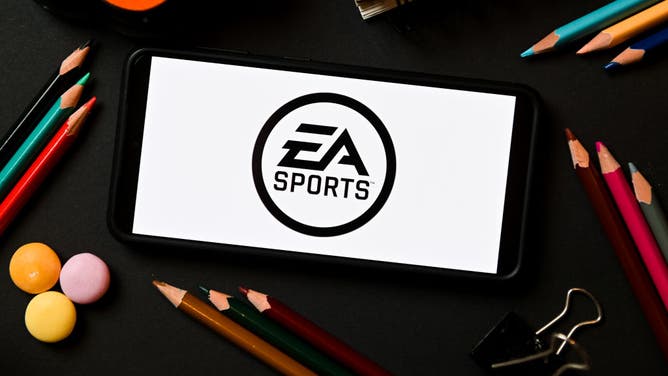EA Sports Being Sued By NIL Agency Over NCAA Football Video Game Not As Big Of Concern For Fans As It Sounds
EA Sports is being sued over its NCAA Football video game. That may sound like a frustrating, disappointing, reality for college football fans who saw the franchise come to a screeching halt over Ed O'Bannon's lawsuit in 2014.
Fortunately, the current lawsuit should not delay the game's release scheduled for the summer of 2024. It's totally different than the revolutionary lawsuit that indirectly took down NCAA video games nearly a decade ago.
For now, at least. Things are always subject to change.

(Photo Illustration by Mateusz Slodkowski/SOPA Images/LightRocket via Getty Images)
So what's going on?
According to documents first obtained by Front Office Sports, The Brandr Group filed a lawsuit in San Mateo County, California (where EA is headquartered), which has since been moved to the Northern District of California — a federal court. Without any context, the lawsuit sounds rather daunting.
However, it has more to do with the company that filed suit than the athletes or the game itself.
The NCAA Football lawsuit is rooted in rights to negotiation.
The Brandr Group has agreements to faciliate group licensing deals for 54 Division-I schools and their athletes. It believes that it should be allowed to negotiate any/all deals for athletes at the schools it represents.
EA Sports reportedly spoke with The Brandr Group multiple times in 2021 and 2022. They discussed how the two parties would work together in negotiating NIL deals for athletes to be featured in the NCAA Football video.
EA Sports then decided last month that it will work with OneTeam Partners to facilitate any group bargaining agreements. The Brandr Group is pissed that EA Sports is trying to bypass its agreements and jurisdiction. In turn, it pursued legal action over "tortious interference."
EA places TBG's Partner Schools in the unenviable position of either breaching their contracts with TBG or potentially losing the opportunity for themselves and their athletes to participate in the game.
EA's tactics will also cause irreparable harm to TBG's Client Athletes, and to every student-athlete who opts-in to their scheme for unfair compensation, because they are being deprived of the opportunity to have their own representative negotiate on their behalves for fair compensation for the use of their NIL.
Although nothing has been announced publicly, the general understanding is that EA Sports (with OneTeam Partners) is set to offer around $500 per athlete to be in the game. There have been some rumblings of a holdout amongst players who might command more than that $500 amount.
A holdout would be a larger concern for the video game's release than The Brandr Group's lawsuit.
What does the lawsuit mean?
The lawsuit has nothing to do with compensation. Well, it does indirectly, but it's not the key component.
It has everything to do with representation and which group represents the players and schools during negotiations with EA Sports— The Brandr Group or OneTeam Partners.
The Brandr Group's lawsuit is rooted in wanting a seat at the table. Brandr wants to be involved in any deals between EA Sports and the 54 schools it represents.
Could things get messier because of this lawsuit? Sure. Things can always get messier.
As of right now, though, this is between Brandr and EA. The schools aren't involved. Neither are the athletes.
The game is not going to look any different. The release date should not be impacted.
Breathe easy... for now.